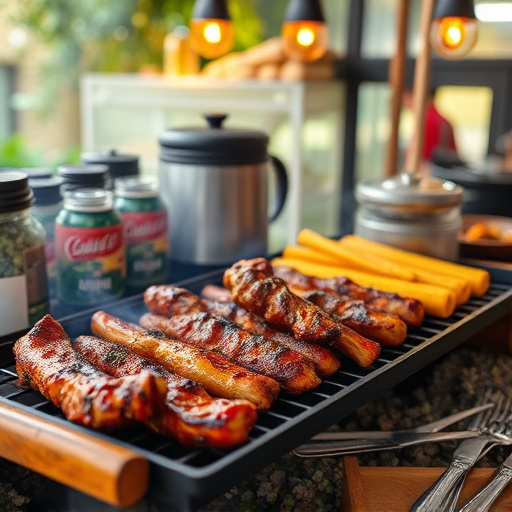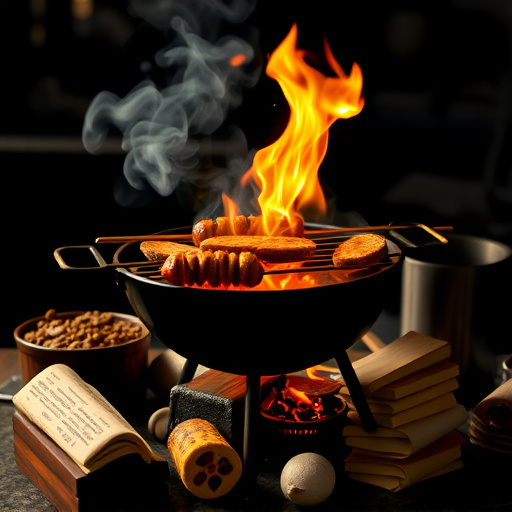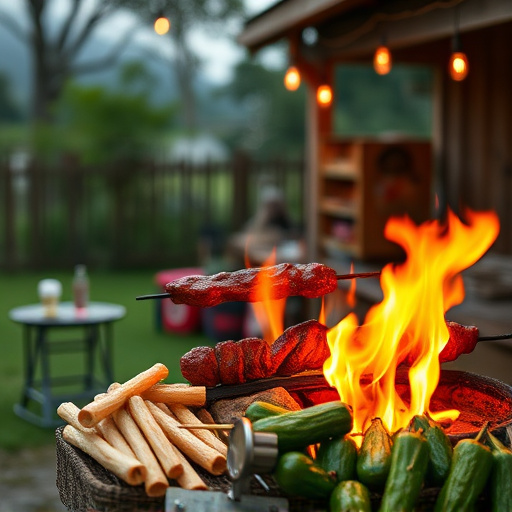When selecting BBQ shrimp for recipes, prioritize freshness and quality: choose firm, vibrant shrimp with clear shells and a mild, sweet aroma. Opt for wild-caught over farmed for better taste. Source locally and check purchase dates. Select shrimp sizes based on your cooking method: larger for grilling, smaller for sauces. For optimal flavor and moisture retention, consider shelled shrimp for grilling. Incorporate various sizes and varieties to achieve a complex, harmonious flavor profile in your BBQ shrimp recipe.
Discover the secrets to crafting mouthwatering BBQ shrimp recipes with perfectly cooked, flavor-bursting shrimp! This guide explores everything from choosing the right shrimp for your grill – focusing on size, variety, and freshness – to mastering marination techniques that transform shrimp into a culinary delight. Learn about grilling vs. skewering, ideal cook times, and alternative indoor methods, ensuring every bite is an explosion of juicy, aromatic goodness. Elevate your BBQ game with these essential tips for the ultimate BBQ shrimp recipe.
- Choosing the Right Shrimp for Your BBQ Recipe
- – Tips on selecting fresh and high-quality shrimp
- – Importance of size and variety for optimal flavor
Choosing the Right Shrimp for Your BBQ Recipe

When it comes to crafting the perfect BBQ shrimp recipe, selecting the right shrimp is half the battle won. Look for large, firm shrimp with clear, bright shells; these are signs of freshness. Fresh shrimp will have a mild, sweet aroma and should be stored on ice or in the refrigerator until ready to use. Avoid any that smell ‘fishy’ as this indicates they’re past their prime. For a truly mouthwatering BBQ experience, opt for wild-caught shrimp whenever possible; they tend to have a richer flavor profile compared to their farmed counterparts.
Consider the size of shrimp suitable for your recipe too. Larger shrimp, typically 16-20 per pound, are ideal for skewering and grilling due to their meaty texture. Smaller varieties, around 35-40 per pound, cook quickly and are perfect for tossing directly into a sizzling BBQ sauce. Ensure you purchase shrimp that are still in the shell if your recipe involves grilling; this adds extra flavor and keeps the shrimp moist during the cooking process.
– Tips on selecting fresh and high-quality shrimp

When it comes to selecting shrimp for your juicy BBQ recipes, freshness and quality are key to achieving that perfect, flavorful bite. Start by looking for shrimp that are firm and vibrant in color; avoid any with a slimy or mushy texture as this could indicate they’re past their prime. The shells should be intact and bright, giving an indication of their freshness. Opting for wild-caught shrimp is often the best choice, as it ensures higher quality and better flavor compared to farmed shrimp.
Check the source and date of purchase; locally sourced, fresh-caught shrimp from reputable suppliers will offer the best taste. In terms of size, choose what suits your preference and BBQ recipe requirements. Larger shrimp might be ideal for skewers or burgers, while smaller varieties are perfect for salads or pasta dishes. Remember, high-quality shrimp will have a sweet, ocean-fresh scent—a clear sign that they’re ready to enhance any BBQ dish!
– Importance of size and variety for optimal flavor

When it comes to achieving perfectly cooked shrimp bursting with flavor, the size and variety of the shrimp play a crucial role. Smaller shrimp, typically ranging from 16 to 20 per pound, tend to have a more intense flavor due to their higher meat-to-shell ratio. This allows the culinary oils and natural tastes to pack a punch in each bite. For a truly exceptional BBQ shrimp recipe, opt for a mix of sizes to ensure a diverse texture and flavor experience—large enough to be satisfying but small enough to cook evenly.
Variety is also key in unlocking optimal flavor. Different varieties of shrimp offer distinct nuances. Some may have a milder taste, while others boast a richer, more robust flavor. Incorporating a blend of these varieties into your BBQ shrimp recipe can create a complex and delightful palate. This mix ensures that no single dominant taste overshadows the others, instead allowing each element to contribute harmoniously to the overall culinary symphony.
